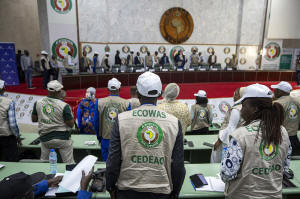|
The withdrawal of the three countries, first announced a year
ago, “has become effective today,” ECOWAS said in a statement.
The bloc, however, said that it has also decided to “keep ECOWAS’
doors open,” requesting member nations to continue to accord the
trio of nations membership privileges, including free movement
within the region with an ECOWAS passport.
Widely seen as West Africa’s top political and regional
authority, the 15-nation ECOWAS was formed in 1975 to “promote
economic integration” in member states. It has struggled in
recent years to reverse rampant coups in the region where
citizens have complained of not benefitting from rich natural
resources.
The bloc has since grown to become the region’s top political
authority, often collaborating with states to solve domestic
challenges on various fronts from politics to economics and
security.
In parts of West Africa, however, ECOWAS has lost its
effectiveness and support among citizens, who see it as
representing only the interests of the leaders and not that of
the masses, said Oge Onubogu, director of the Africa Program at
the Washington-based Wilson Center think tank.
After coming into power, the juntas in Niger, Mali and Burkina
Faso announced that they were leaving ECOWAS, and they created
their own security partnership, the Alliance of Sahel States, in
September.
It’s the first time in the bloc’s half-century of existence that
its members have withdrawn in such a manner. Analysts say it’s
an unprecedented blow to the group that could threaten efforts
to return democracy and help stabilize the increasingly fragile
region.
ECOWAS said that its members were also required to treat goods
and services coming from the three countries in according with
ECOWAS regulations and provide full support and cooperation to
ECOWAS officials from the countries during their assignments.
All contents © copyright 2025 Associated Press. All rights
reserved |
|




